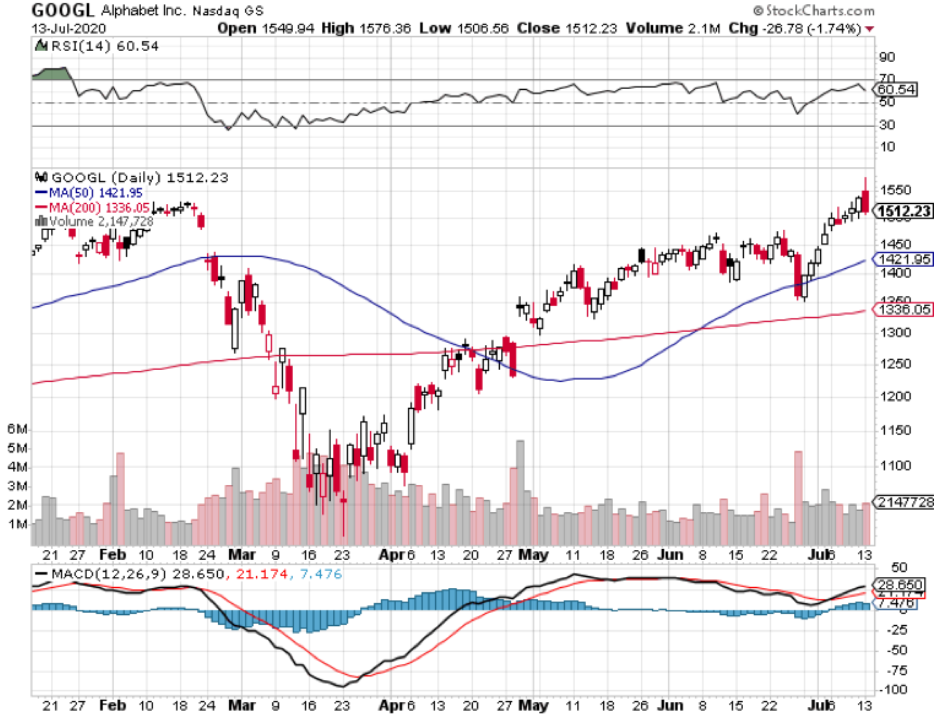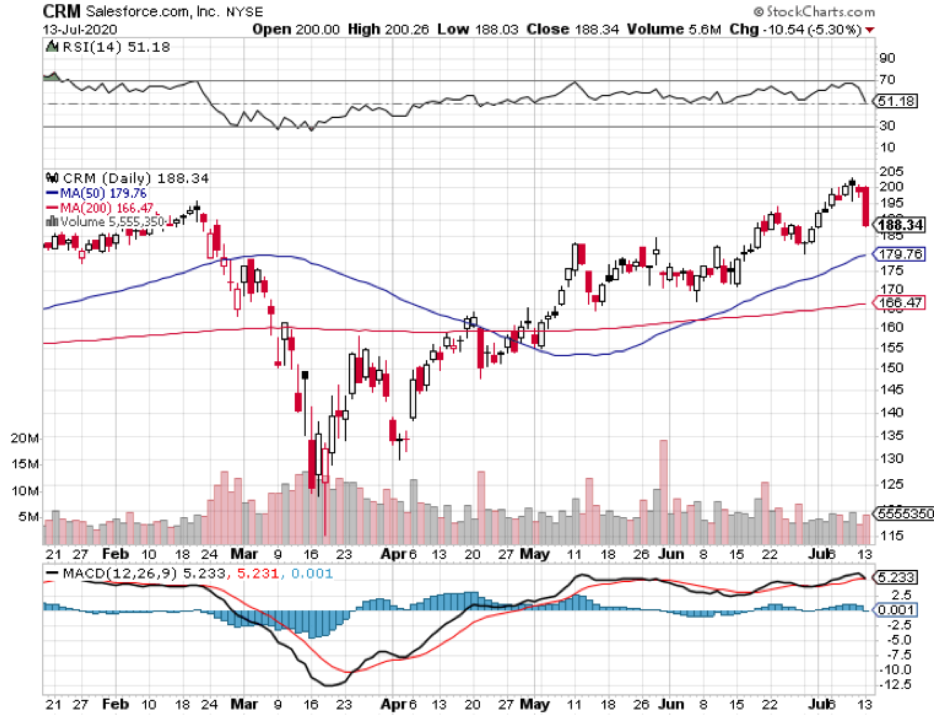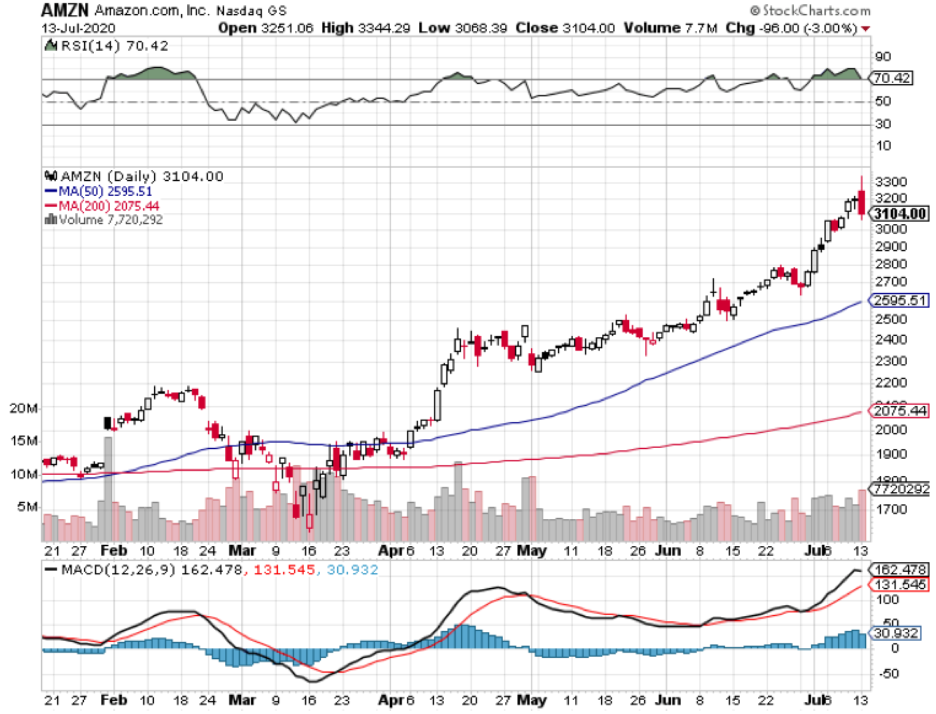While the Diary of a Mad Hedge Fund Trader focuses on investment over a one week to a six-month time frame, Mad Day Trader, provided by Bill Davis, will exploit money-making opportunities over a brief ten minute to three-day window. It is ideally suited for day traders, but can also be used by long-term investors to improve market timing for entry and exit points. Read more
Global Market Comments
July 16, 2020
Fiat Lux
Featured Trade:
(THE TRADE OF THE CENTURY IS SETTING UP),
(TLT),
(A COW-BASED ECONOMICS LESSON)

Mad Hedge Technology Letter
July 15, 2020
Fiat Lux
Featured Trade:
(CLOUD 101)
(AMZN), (MSFT), (GOOGL), (DOCU), (CRM), (ZS)

If you've been living under a rock the past few years, the cloud phenomenon hasn't passed you by and you still have time to cash in.
You want to hitch your wagon to cloud-based investments in any way, shape, or form.
Amazon leads the cloud industry it created.
It still maintains more than 30% of the cloud market. Microsoft would need to gain a lot of ground to even come close to this jewel of a business.
Amazon (AMZN) relies on AWS to underpin the rest of its businesses and that is why AWS contributes most of Amazon's total operating income.
Total revenue for just the AWS division would operate as a healthy stand-alone tech company if need be.
The future is about the cloud.
These days, the average investor probably hears about the cloud a dozen times a day.
If you work in Silicon Valley, you can triple that figure.
So, before we get deep into the weeds with this letter on cloud services, cloud fundamentals, cloud plays, and cloud Trade Alerts, let's get into the basics of what the cloud actually is.
Think of this as a cloud primer.
It's important to understand the cloud, both its strengths and limitations.
Giant companies that have it figured out, such as Salesforce (CRM) and Zscaler (ZS), are some of the fastest-growing companies in the world.
Understand the cloud and you will readily identify its bottlenecks and bulges that can lead to extreme investment opportunities. And that's where I come in.
Cloud storage refers to the online space where you can store data. It resides across multiple remote servers housed inside massive data centers all over the country, some as large as football fields, often in rural areas where land, labor, and electricity are cheap.
They are built using virtualization technology, which means that storage space spans across many different servers and multiple locations. If this sounds crazy, remember that the original Department of Defense packet-switching design was intended to make the system atomic bomb proof.
As a user, you can access any single server at any one time anywhere in the world. These servers are owned, maintained, and operated by giant third-party companies such as Amazon, Microsoft, and Alphabet (GOOGL), which may or may not charge a fee for using them.
The most important features of cloud storage are:
1) It is a service provided by an external provider.
2) All data is stored outside your computer residing inside an in-house network.
3) A simple Internet connection will allow you to access your data at any time from anywhere.
4) Because of all these features, sharing data with others is vastly easier, and you can even work with multiple people online at the same time, making it the perfect, collaborative vehicle for our globalized world.
Once you start using the cloud to store a company's data, the benefits are many.
- No Maintenance
Many companies, regardless of their size, prefer to store data inside in-house servers and data centers.
However, these require constant 24-hour-a-day maintenance, so the company has to employ a large in-house IT staff to manage them - a costly proposition.
Thanks to cloud storage, businesses can save costs on maintenance since their servers are now the headache of third-party providers.
Instead, they can focus resources on the core aspects of their business where they can add the most value, without worrying about managing IT staff of prima donnas.
- Greater Flexibility
Today's employees want to have a better work/life balance and this goal can be best achieved by letting them telecommute. Increasingly, workers are bending their jobs to fit their lifestyles, and that is certainly the case here at Mad Hedge Fund Trader.
How else can I send off a Trade Alert while hanging from the face of a Swiss Alp?
Cloud storage services, such as Google Drive, offer exactly this kind of flexibility for employees.
With data stored online, it's easy for employees to log into a cloud portal, work on the data they need to, and then log off when they're done. This way a single project can be worked on by a global team, the work handed off from time zone to time zone until it's done.
It also makes them work more efficiently, saving money for penny-pinching entrepreneurs.
- Better Collaboration and Communication
In today's business environment, it's common practice for employees to collaborate and communicate with co-workers located around the world.
For example, they may have to work on the same client proposal together or provide feedback on training documents. Cloud-based tools from DocuSign, Dropbox, and Google Drive make collaboration and document management a piece of cake.
These products, which all offer free entry-level versions, allow users to access the latest versions of any document so they can stay on top of real-time changes which can help businesses to better manage workflow, regardless of geographical location.
- Data Protection
Another important reason to move to the cloud is for better protection of your data, especially in the event of a natural disaster. Hurricane Sandy wreaked havoc on local data centers in New York City, forcing many websites to shut down their operations for days.
The cloud simply routes traffic around problem areas as if, yes, they have just been destroyed by a nuclear attack.
It's best to move data to the cloud, to avoid such disruptions because there your data will be stored in multiple locations.
This redundancy makes it so that even if one area is affected, your operations don't have to capitulate, and data remains accessible no matter what happens. It's a system called deduplication.
- Lower Overhead
The cloud can save businesses a lot of money.
By outsourcing data storage to cloud providers, businesses save on capital and maintenance costs, money that in turn can be used to expand the business. Setting up an in-house data center requires tens of thousands of dollars in investment, and that's not to mention the maintenance costs it carries.
Plus, considering the security, reduced lag, up-time and controlled environments that providers such as Amazon's AWS have, creating an in-house data center seems about as contemporary as a buggy whip, a corset, or a Model T.
When John identifies a strategic exit point, he will send you an alert with specific trade information as to what security to sell, when to sell it, and at what price. Most often, it will be to TAKE PROFITS, but, on rare occasions, it will be to exercise a STOP LOSS at a predetermined price to adhere to strict risk management discipline. Read more
I mentioned this morning that I would be looking to close the QQQ debit spread we placed yesterday.
There are two main reasons for this.
The first is that I did not suggest you buy a lot of time.
And the second is that the QQQ is flirting with the upper band on the daily chart.
Also, the QQQ is trading around $262 as I write this, which is around the price objective I was looking for.
Here is how you close the position:
Sell to Close July 24th - $257 Call for $8.60
Buy to Close July 24th - $263 Call for $5.00
The net credit will be $3.60 per spread.
The net is a profit of $1.60 per spread or $640 if you traded the suggested 4 lot.
The overnight return is 80%.
While the Diary of a Mad Hedge Fund Trader focuses on investment over a one week to a six-month time frame, Mad Day Trader, provided by Bill Davis, will exploit money-making opportunities over a brief ten minute to three-day window. It is ideally suited for day traders, but can also be used by long-term investors to improve market timing for entry and exit points. Read more
Global Market Comments
July 15, 2020
Fiat Lux
Featured Trade:
(11 FACTORS THAT COULD KILL OFF THIS BULL MARKET)

I have lately been besieged with emails from followers asking if they should sell everything, put all their money into cash, and if the great bull market is well and truly over.
My answer is the same to all. If a full-throated and affirmative “NOT YET”. Things may look scary now, but they could get a lot worse, and eventually, that will take place.
I’ll tell you why. I have a laundry list of issues that could kill the bull once and for all. And while some of them are flashing alarm signals, many aren’t. I’ll go through them one by one.
The Pandemic Gets Totally Out of Control – Shutting down much of the economy and preventing kids from going back to school. As the stimulus tap (call it what it really is, disaster rescue) runs dry, tens of millions will lose jobs. Stocks could make a secondary low similar to the one we saw in March.
The Trade War –If each escalation is met with Chinese retaliation, then both countries will stay in a Depression. At some point, cooler heads may prevail but that is no sure thing. Having met several men who endured the 1936-38 Long March, I can assure you that the Chinese have a far better ability to sustain pain than we do. And the Chinese don’t have an election this year.
Cyber Terrorism – Imagine that you sat down to turn on your computer one day and nothing happened. The Internet was down, all financial transactions ceased, the power went out, and all food distribution ceased. America’s Internet infrastructure is far more vulnerable than most people realize. That's why I have been recommending cybersecurity stocks for the past decade. Certainly, my own local utility, PG&E (PGE) doesn’t maintain security to s military standard. It should.
Debt Levels in China – It’s easy to forget that perhaps 40% of China’s government-owned financial institutions are de facto bankrupt. They have been accumulating bad loans for decades and hiding them on their balance sheets and essential negative net worth. If one suddenly goes under, it could easily lead to a cascading series of bankruptcy’s much like we saw in the US during the 2008 financial crisis that spills over to the US and Europe. Back then, we lost Lehman Brothers and Bear Steans and could have lost everyone if the government hadn’t stepped in.
Debt levels in the US – Passage of the latest stimulus bill means the US national debt is about to soar from $24 to $22 trillion by 2021. The markets are ignoring this for now. It won’t forever.
Movement to the Left – Trump has run the most radically right-wing government in American history. Can you believe that we are now in the concentration camp business? The risk is that the electorate responds by installing a radical left-wing government in 2020 in reaction. That would bring a return of 90% personal tax rates, 28% corporate tax rates, the elimination of long term capital gains treatments, and other policies with a strong anti-business tilt.
Global Interest Rates at Zero –Once at zero central banks will be powerless to get us out of recessions buy cutting rates. Just look at how Japan has done over the past 30 years.
2020 Election – It going to be loaded with fireworks to be sure. The rancor may get so extreme on both sides that it literally scares people out the market.
Middle East War – War with Iran, which is now threatened daily by the administration, will be an enormous drag on the US economy. Investment shifts from machinery to weapons, which have no impact on productivity.
Trump Blows Up – The president implements a policy that is so deleterious to the US economy that the stock market panics. Some would argue we are already there.
Climate Change Accelerates – That is already happening but is hurting countries closer to the equator than ourselves, like India and Egypt. The US military certainly considers this an existential threat. Increased severe hurricanes, heat caused crop failures, wildfires, and more frequent flooding are already having severe localized effects. Imagine all that getting much worse. And there are severe impacts which we haven’t even thought about yet. The first effect we have already seen? Higher insurance premiums for everyone. Good luck getting new fire insurance in California or flood insurance in Florida.
She Doesn’t Live Forever
"There's a 70% chance you could lose it all," said Jeff Bezos to his parents when asking for a $100,000 investment to start Amazon. "I want you to know the risks because I want to be able to come home for Thanksgiving."
Legal Disclaimer
There is a very high degree of risk involved in trading. Past results are not indicative of future returns. MadHedgeFundTrader.com and all individuals affiliated with this site assume no responsibilities for your trading and investment results. The indicators, strategies, columns, articles and all other features are for educational purposes only and should not be construed as investment advice. Information for futures trading observations are obtained from sources believed to be reliable, but we do not warrant its completeness or accuracy, or warrant any results from the use of the information. Your use of the trading observations is entirely at your own risk and it is your sole responsibility to evaluate the accuracy, completeness and usefulness of the information. You must assess the risk of any trade with your broker and make your own independent decisions regarding any securities mentioned herein. Affiliates of MadHedgeFundTrader.com may have a position or effect transactions in the securities described herein (or options thereon) and/or otherwise employ trading strategies that may be consistent or inconsistent with the provided strategies.






